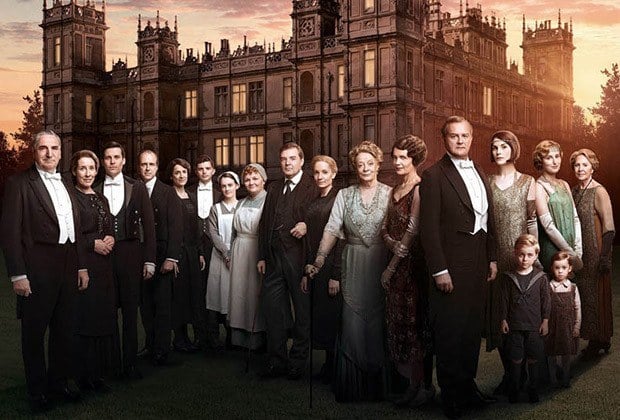The wildly popular period piece is on its way out. How much of history did it get right — and wrong?

The cast of Downton Abbey.
Downton Abbey has come to an end. The sixth and final season of the wildly successful costume drama finished taping last week, and a major (and perhaps surprising) motivation behind the show’s unpopular end is history itself.
Though the period drama is bidding us adieu, online and at-the-table discussions about the show continue, ranging from the accuracy of Downton table settings to the series’ costumes and corsets. In keeping with that spirit, here are four Downton plots that we think might have deserved some deeper digging:
The Entail
The pilot episode takes place in 1912, just after the sinking of the RMS Titanic, which carried the heir apparent to Downton’s estate. The Crawley family, who owns the estate, has only managed to produce daughters, which is problematic since the daughters cannot inherit Downton. This is because of “the entail“— a phrase uttered expositionally throughout the first few episodes by practically every character.
The Crawley daughters’ inability to inherit has to do with primogeniture, which guided the British monarchy for centuries. In short, titles could be passed through men, not women. In some iterations, the title couldn’t even pass through a daughter to a legitimate son – primogeniture dictated, quite strictly, that titles belonged to male heirs and could not be tainted by a woman’s genteel touch.
Matthew Crawley.
The inheritance of the title brings with it the inheritance of real estate – referred to as the entail. The Crawley family’s strict adherence to the primogeniture means that cousin Matthew – not a Crawley daughter – gets the title, and the entail gets him everything else.
The eldest Crawley daughter – who is understandably miffed about all this – ends up marrying distant Cousin Matthew and they have a son. Spoiler alert: Matthew dies in Season 3. That means that his son with Mary becomes the heir. Phew.
However, the final series of Downton (which will air this fall in the UK) takes place in 1925, the same year that England abolished the entail. The primogeniture for titles remained, but as for inheriting real estate? It’s no more! That means that, technically speaking, the Robert Crawley could leave the whole kit and kaboodle to his eldest daughter, “solving” one of the show’s major problems for once and for all.
Image Source: Giphy
But here’s the kicker: he could have done that anyway, before 1925. By executing something called a disentailing deed, Crawley could have barred the entail and left Downton and all its trappings to his daughter. That, of course, would have meant no show – so we’re happy that Dad didn’t disentail.
Having A Child Out Of Wedlock
Edith Crawley.
In the fifth season, the middle and often ignored daughter Edith gets pregnant by a newspaper mogul named Michael Gregson. Unlike her sister Mary, Edith lacked the foresight to procure birth control. To make matters worse, Gregson then disappears, leaving pregnant Edith completely alone. She contemplates having an abortion – but ultimately decides to have the baby and give it up for adoption, rather than soil her family’s glittery reputation.
This being the early 1920s, Edith’s decision not to have an abortion may well have been as much out of fear for her safety as it was a fear of social reprisal. At this time, most surgeries were still being performed rudimentarily, without modern antibiotics or life-saving technologies like blood transfusions (which were still in their infancy after World War I, when they had been performed on the battlefield).
As opposed to these surgeries, Edith would more likely have had a forced miscarriage by way of an abortifacient. Of course, this carried its own health risks and since Edith’s younger sister, Sybil, died from complications during childbirth a few years earlier (more on that later) it would not likely have been a risk she’d be willing to take.
It would not be unheard of for someone of Edith’s social standing to pay someone off to take in a “foundling,” and numerous examples of this are peppered throughout classic literature. Still, Edith’s connection to her daughter and desire to raise her ultimately leads her to bring the child back to Downton and admit to her parents that the girl is, in fact, hers.
But for most women in Edith’s position in interwar Europe, the financial and social difficulties of being an unwed mother would have prevented them from having the same happy ending that Edith did.
For many women raising children alone, it had been the war that had taken away their spouses. The phenomenon of single mothers in the interim between the first and second World Wars in Europe was not a minor one, though it would have been even less acceptable for a woman of Edith’s social standing, hence why it was so shrouded in secrecy.
Eclampsia
Sybil, one of the show’s most beloved characters.
One of Downton‘s most beloved characters was the youngest Crawley daughter, Sybil. The sweet but rebellious Sybil fell in love with the family’s Irish chauffeur (an important qualifier, since Ireland and England were not exactly buddy-buddy at this point in history) and they married and had a child together.
In a plot twist required by the actress’ disinterest in renewing her contract, Sybil dies shortly after giving birth to her daughter in the third season. Writers sprinkled plenty of hints that something was amiss: in fact, the family’s trusted doctor (the very Scottish Dr. Clarkson) is constantly at odds with a presumably more “legit” doctor who, in the end, completely misses the signs of Sybil’s distress – eclampsia.
Eclampsia occurs when a woman’s blood pressure rises dangerously high before, during and/or after giving birth. Signs of pre-eclampsia, the state that precedes the more critical state of being eclamptic, may be so insidious that they are misconstrued as harmless. By the time true eclampsia sets in, the course is final — and fatal. Eclampsia itself manifests with severe seizures, a horrific headache, swelling, nausea and eventually fatal hemorrhaging.
Image Source: Giphy
The key to diagnosing and preventing eclampsia is keeping a close eye on a mother’s blood pressure reading and testing her urine for protein. In modern day obstetrics, this is part and parcel for prenatal care. But in the early to mid 1900s, the science was imperfect. Differences of opinion and time-wasting ego puffing ultimately lead to Sybil’s death, something that certainly isn’t unique to Downton‘s time.
While the show nailed the vagaries of preeclampsia symptoms – which even one hundred years later are still sometimes missed or misconstrued as “normal” pregnancy symptoms in their early stages – both doctors at Lady Sybil’s side somehow “forgot” that magnesium sulfate had been shown to work not only as a prophylaxis for eclampsia, but a potentially life saving treatment as early as 1905.
Lady Sybil may have ultimately succumbed anyway, but any doctor worth his salt (no pun intended in regards to MgSO4) would have at least made an attempt to administer a dose, and at the very least should have had it on hand to attend a home childbirth.
Romance Downstairs
One of the show’s most memorable moments was when a downstairs romance resulted in a ring.
Upstairs and downstairs love stories have abounded throughout the series, whether it be between Mary and her parade of suitors or the tormented but pure love of Anna and Mr. Bates. But the most striking and, perhaps, daring foray into servant-style romance came during the Christmas Special, where stolid butler Carson proposes to the benevolent housekeeper, Mrs. Hughes.
Here’s the problem: it was prescript that the individuals holding these positions remain unmarried. Housekeepers were always Mrs., an honorific title given as a form of respect, differentiating them for lesser ranking female servants.
In fairness, it wasn’t altogether uncommon for former butlers and housekeepers of these grand estates to set off into the sunset together, but they would likely do so as business owners, not as husband and wife. If the latter happened while they were still employed, it would be grounds for firing one or both of them (the butler, because he’s male, would slightly outrank even the housekeeper and as such, it would most likely be the woman who would be sacked).
[gifdog src="https://allthatsinteresting.com/wordpress/wp-content/uploads/2015/08/downton-abbey-history-housekeeper.gif" alt="Downton Abbey History Housekeeper" width="500" height="281" class="size-full wp-image-54782"]
When two megaliths of a life of service did decide to join forces, romantic or not, they could only hope to end up as famous as Samuel and Sarah Adams. The Adamses were, in fact, a married butler and housekeeper duo in Regency England who, together, penned what became the ultimate totem of life downstairs: The Complete Servant.





